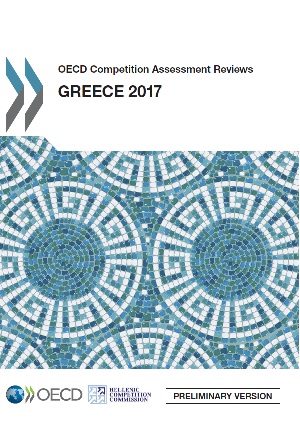Labrianidis, Lois, Pratsinakis, Manolis, (2016), “Brain drain and the Greek crisis”, LSE Hellenic Observatory, 6 December In the context of the debt crisis, recession, austerity and their socio-political consequences, Greece is experiencing a new major wave of out-migration. Emigration has become a survival strategy for many people who are finding it hard to make ends meet, while, at the same time, it has also emerged as an increasingly appealing option …Read More
IMF Indecision on Bailout Faulted by Greek Economy Minister
Bensasson, Marcus, (2016), “IMF Indecision on Bailout Faulted by Greek Economy Minister”, Levy Economics Institute, 28November The time has come for the International Monetary Fund to make up its mind on Greece, according to the country’s economy minister. The path to recovery runs sequentially through completion of Greece’s bailout review, debt relief and then admission to the European Central Bank’s quantitative easing program, said Dimitri Papadimitriou, an economist who joined …Read More
The Determinants of Loan Loss Provisions: An Analysis of the Greek Banking System in Light of the Sovereign Debt Crisis
Monokroussos, Platon, D. Thomakos, Dimitrios, A. Alexopoulos, Thomas, (2016), “The Determinants of Loan Loss Provisions: An Analysis of the Greek Banking System in Light of the Sovereign Debt Crisis”, LSE Hellenic Observatory GreeSE Paper No.104, November We utilize a new set of macroeconomic and regulatory data to analyze the evolution of loan loss provisioning practices in the Greek banking system over the period 2005-2015. We explore the determinants of the aggregate …Read More
Second programme review – Important milestones & timeline of key dates and events
Petropoulou, Paraskevi, Dimitriadou, Anna, (2016), “Second programme review – Important milestones & timeline of key dates and events”, Eurobank Research, 18 November This report presents the key themes of the current juncture in light of the 2nd programme review, which is well underway and its importance to the Greek economy’s short and medium term prospects. Firstly, we present the key milestones ahead that will determine whether Greece will be able …Read More
The time is up! A realistic proposal to end Greece’s debt overhang
Marsh, Chris, Nagly, Dominik, Pagoulatos, George, Papaioannou, Elias, (2016), “The time is up! A realistic proposal to end Greece’s debt overhang”, VoxEu, 17 November It is now seven years since the Greek crisis began. As well as reflecting the chronic deficiencies of its own institutions, the failings in Greece also reflect substantial shortcomings in international institutions. This column argues that it is time for all sides to move on, and proposes …Read More
Inter-industry wage differentials in Greece: rent-sharing and unobserved heterogeneity hypotheses
Papapetrou, Evangelia, Tsalaporta, Pinelopi, (2016), “Inter-industry wage differentials in Greece: rent-sharing and unobserved heterogeneity hypotheses”, Bank of Greece, 10 November This paper examines the structure and determinants of inter-industry wage differentials in Greece, along with the role of the rent-sharing and unobserved heterogeneity hypotheses, employing restricted least squares and quantile regression techniques with cluster robust standard errors at the firm level. To this end, a unique dataset, the European Union Structure …Read More
OECD Competition Assessment Reviews – GREECE 2017
OECD, (2016), “OECD Competition Assessment Reviews – GREECE 2017”, OECD Publishing, 7 November After suffering one of the longest and most serious economic crises ever experienced by any European country, which resulted in a severe drop of real GDP and major losses in employment and incomes, the Greek economy is projected to improve in 2016-2017. Progress has been made in balancing the budget and implementing significant labour market and fiscal …Read More
QE for Greece: a necessary precondition for stabilizing investor sentiment and preventing the need for further official sector financing post-2018
Monokroussos, Platon, (2016), “QE for Greece: a necessary precondition for stabilizing investor sentiment and preventing the need for further official sector financing post-2018”, Eurobank, 25 October Taking into consideration the most recent comments by a number of key EU officials on Greece’s possible inclusion in the ECB’s quantitative easing (QE) program this note updates our recent analysis on the issue, focusing on the key preconditions for and the potential timeline …Read More
Why austerity is easier to implement in some countries than others – and why this was not the case for Greece
Walter, Stefanie, (2016), “Why austerity is easier to implement in some countries than others – and why this was not the case for Greece”, LSE EUROPP Blog, 17 October It is now roughly seven years since the Greek economic crisis first emerged, but why has the crisis in Greece proven so difficult to address in comparison to other Eurozone countries? Based on an analysis of crisis management in several European …Read More
The Political Economy of NPLs resolution: Ownership and conditionality
Panagiotarea, Eleni, (2016), “The Political Economy of NPLs resolution: Ownership and conditionality”, Hellenic Observatory LSE, 13 October Greece’s non-performing exposure ratio is the second highest in Europe, largely linked to the unprecedented contraction of domestic economic activity in recent years. Causality is known to go both ways, with persistently high non-performing loans (NPLs) constituting a drag on credit and GDP growth. Theoretically, Greek governments keen to reduce the debt overhang …Read More





